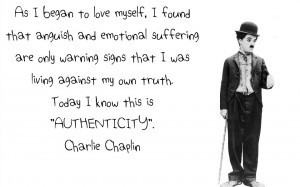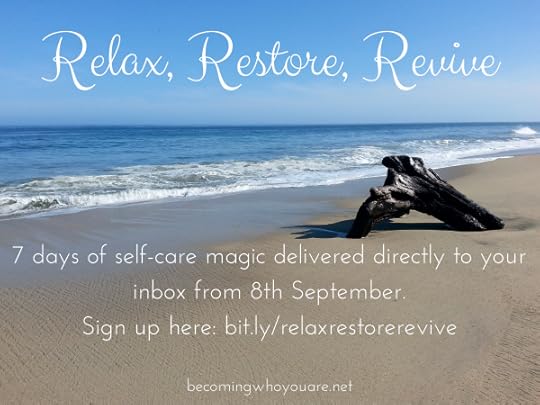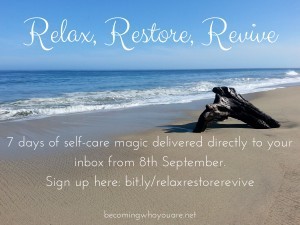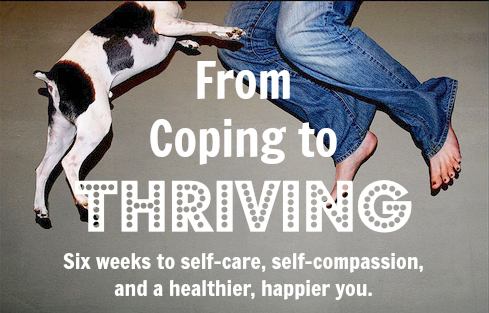Hannah Braime's Blog, page 29
September 29, 2014
As I Began to Love Myself…
Last week, I shared the following quote by Charlie Chaplin in The Tribe:
Powerful stuff, right?
Tribe member Josette did some research and found the entire quote, which is even more beautiful, and that’s what I want to share with you today:
As I began to love myself I found that anguish and emotional suffering are only warning signs that I was living against my own truth. Today, I know, this is “AUTHENTICITY”.
As I began to love myself I understood how much it can offend somebody if I try to force my desires on this person, even though I knew the time was not right and the person was not ready for it, and even though this person was me. Today I call it “RESPECT”.
As I began to love myself I stopped craving for a different life, and I could see that everything that surrounded me was inviting me to grow. Today I call it “MATURITY”.
As I began to love myself I understood that at any circumstance, I am in the right place at the right time, and everything happens at the exactly right moment. So I could be calm. Today I call it “SELF-CONFIDENCE”.
As I began to love myself I quit stealing my own time, and I stopped designing huge projects for the future. Today, I only do what brings me joy and happiness, things I love to do and that make my heart cheer, and I do them in my own way and in my own rhythm. Today I call it “SIMPLICITY”.
As I began to love myself I freed myself of anything that is no good for my health – food, people, things, situations, and everything that drew me down and away from myself. At first I called this attitude a healthy egoism. Today I know it is “LOVE OF ONESELF”.
As I began to love myself I quit trying to always be right, and ever since I was wrong less of the time. Today I discovered that is “MODESTY”.
As I began to love myself I refused to go on living in the past and worrying about the future. Now, I only live for the moment, where everything is happening. Today I live each day, day by day, and I call it “FULFILLMENT”.
As I began to love myself I recognized that my mind can disturb me and it can make me sick. But as I connected it to my heart, my mind became a valuable ally. Today I call this connection “WISDOM OF THE HEART”.
We no longer need to fear arguments, confrontations or any kind of problems with ourselves or others. Even stars collide, and out of their crashing new worlds are born. Today I know “THAT IS LIFE”!
Happy loving :)
Photo: Jake Givens
The post As I Began to Love Myself… appeared first on Becoming Who You Are.









September 27, 2014
#65: The 30-Day Journaling Challenge with Nathan Ohren
In today’s episode, I’m delighted to welcome back Nathan Ohren. Nathan is the host of the Journal Talk podcast and the creator of the 30-Day Digital Journaling Challenge, which is starting 1st October. I’m honoured to be taking part in the challenge as a contributor and my ebook, The Ultimate Guide to Journaling, is one of the prizes up for grabs during the challenge.
We talk about:
Nathan’s journey into journaling and why he is so passionate about sharing this practice with other people
His initial skepticism about digital journaling and how he overcame it
The proven benefits of journaling
What the 30-Day Digital Journaling Challenge is all about and how it could help you expand your journaling practice
…and much more!
Useful Links
Journal Talk – Nathan’s podcast
The 30-Day Digital Journaling Challenge
The Ultimate Guide to Journaling
Say Hello
Nathan
Twitter: @Write4LifeCoach
Website: write4life.us
Hannah
Twitter: @becomewhour
G+: plus.google.com/+HannahBraimeBWYA
Website: becomingwhoyouare.net
Subscribe to the Podcast
Intro and outro: Stephanie Murphy
Image credit: Craig Garner
The post #65: The 30-Day Journaling Challenge with Nathan Ohren appeared first on Becoming Who You Are.










September 22, 2014
5 Things Authenticity is Not
Listen to this post here:
Authenticity has become a buzzword in our culture and, consequently, there are a lot of misconceptions around what authenticity really means and what it looks like. Sometimes it’s just as helpful to be able to define what something is not as it is to define what something is, so here are five key things that authenticity is most definitely not:
1. Authenticity is not radical honestyOne of the biggest misconceptions about authenticity is the idea that if we’re truly being authentic, then we’re being 100% honest 100% of the time. This isn’t authenticity, it’s Radical Honesty which is quite a different deal. Radical Honesty is based on the idea that most of the stress and pain we experience is caused by lying, so if everyone were more honest about their thoughts and judgements about other people, we’d all be a lot happier.
From what I’ve read about Radical Honesty, it appears to be authenticity minus empathy. Personally, I’ve found that cultivating empathy and understanding towards other people encourages intimacy, rather than being brutally honest. I’ve felt a lot safer being myself with other people when I know that my “self” is going to be received with understanding and acceptance, rather than judgement and shaming.
Just because we have a thought doesn’t mean we need to share it “as is”. When we’re honest and take into consideration the impact of our words, we create a safe space for self-expression for ourselves and for others.
2. Authenticity is not about showing up the same way in all situations.When I first started exploring the idea of authenticity, I thought that being “authentic” meant behaving in exactly the same way in all situations.
I was wrong.
An important part of reconnecting with our authentic selves is reconnecting with our boundaries.
Click To Tweet - Powered By CoSchedule
Having healthy boundaries means we don’t behave the same in all situations. We’re still the same person, but we show more or less, or different sides of ourselves depending on who we’re interacting with and what our relationship is to them.
For example, when I interact with clients, I have different kinds of conversations with them than I do with friends or my husband. When I’m in a client session, the focus is on them, not on me. I don’t spend the first half of the session talking about my latest travel plans or what I did at the weekend, because that would be disrespectful. When I’m catching up with friends, however, it would be kind of weird if I approached our conversations in the same way I do with clients.
Authenticity is about being the same person in all situations, but we naturally show up in different ways and reveal different sides of ourselves depending on the context of a particular situation.
3. Authenticity is not necessarily revealing everything to everyone.This is another boundaries issue, and it’s one of my pet peeves. Having grown up in an environment with boundaries that were shaky at best, part of becoming more of who I am has been acknowledging that I only want to be around people who show empathy and respect for themselves and other people by honouring the boundaries of our relationship.
As I wrote about in this blog post on vulnerability versus over-sharing, revealing super intimate details about ourselves before the relationship is ready is not a gateway to greater intimacy in general, it’s actually a barrier.
In certain situations, such as coaching and therapy, revealing is an integral, even necessary, part of the process. That works, because there’s a mutually understood agreement about what our time together is for. Revealing everything to everyone becomes an issue in our day-to-day relationships when there isn’t that mutually understood (and earned) agreement.
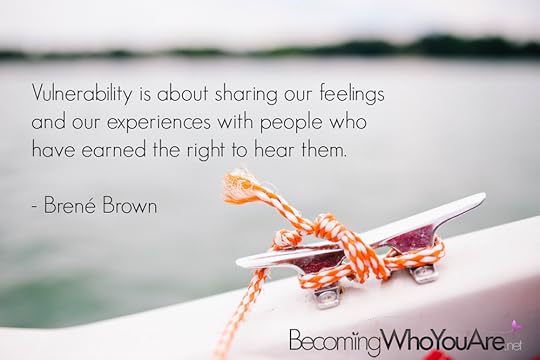
The fact is that we don’t need to reveal everything about ourselves to everyone in order to be authentic. What is more authentic is actually being prudent about who we share the more personal parts of ourselves with (I always feel super honoured that my clients have chosen to work with me for this very reason).
When we make a practice of sharing everything with everyone, we not only risk repelling people who have healthy boundaries, but we also open ourselves up to the risk psychological and emotional harm from people who haven’t earned the right to an intimate relationship with us.
4. Authenticity is not a contest.There are no prizes for being “the most authentic” person in a group, and it’s not a means to feel superior over others. Authenticity has become a bit of a buzzword in our society, and the darker side of that is that a few people have started to use it as a judgement. I don’t often receive angry/provocative emails but on the occasions I have, the most common jibe I hear is “If you were really authentic, you’d do XYZ”.
Needless to say, this completely misses the point of what authenticity is: it’s behaving in a way that is true to our own needs, preferences, and values. We are the best judge of what authenticity looks like for us, and no one else has any business judging us based on their evaluation of how authentic we’re being or not.
5. Authenticity is not a destination.What authentic looks like will change from one year to the next—hell, even one day to the next. In Spanish, there are two forms of the verb “to be”. On a very general level, one type, “estar”, expresses temporary states, such as physical feelings, emotions, and locations, while another, “ser” expresses more permanent states, such as nationality and gender.
The way I think about being authentic is that it is “being” in the “estar” sense. We don’t work at our authenticity and then wake up one day to discover (tada!) we are finally authentic. It’s a process, and one that is happening with each moment-to-moment decision we make.
While authenticity can feel like hard work at times—and during those times, we might wish for a permanent solution—the fact that it’s a process is actually a great thing. It means we have the power to create an authentic future, whatever has happened behind us. It means we have the choice to decide how we show up today, tomorrow, and beyond, and show up in a way that feels more authentic to us. Ultimately, it means that it’s never too late to become who we are.
Let’s flip this around: What *is* authenticity to you? Leave a comment and let me know.
P.S. The power of vulnerability & shift happens
Thanks for reading. If you know someone who might be interested in this post, please share it using the buttons below.
Get the free ebook “The 5 Most Common Blocks to Authenticity… and How to Overcome Them” plus weekly updates, product discounts and much more:
Image: Sylwia Bartyzel
The post 5 Things Authenticity is Not appeared first on Becoming Who You Are.








 CommentsGreat article indeed, like a very nutritionally dense meal. Not ... by BruceThanks for this great post, Hannah! I seem to have been talking ... by Andy
CommentsGreat article indeed, like a very nutritionally dense meal. Not ... by BruceThanks for this great post, Hannah! I seem to have been talking ... by Andy
September 15, 2014
Episode 64: The Value of Self-Knowledge with Kate Marolt
 In this episode, I’m talking to the lovely Kate Marolt. Kate is the Body and Soul Connection Guide at Soul Wild Free, where she guides women on the path of Wild Freedom in their businesses, relationships, and lives. She is on a mission to create a world of love, connection, freedom, and adventure for herself and others, and believes the fastest way for us to do this is to heal our relationships with ourselves and our bodies.
In this episode, I’m talking to the lovely Kate Marolt. Kate is the Body and Soul Connection Guide at Soul Wild Free, where she guides women on the path of Wild Freedom in their businesses, relationships, and lives. She is on a mission to create a world of love, connection, freedom, and adventure for herself and others, and believes the fastest way for us to do this is to heal our relationships with ourselves and our bodies.
and much more!
(Apologies for the choppy quality at points during this episode—it’s one of the hazards of live recordings!)
Share the wisdomSometimes self-care is stopping and taking a single deep breath.
Click To Tweet - Powered By CoSchedule
Let your feelings be your guides instead of your captors.
Click To Tweet - Powered By CoSchedule
When you break a commitment to yourself, you're breaking your understanding of who you are.
Click To Tweet - Powered By CoSchedule
Want to have a one-to-one chat with Kate? Click here to book a conversation.
Say HelloKate
Facebook: facebook.com/superchargeyourlife
Twitter: @kate_marolt
Website: katemarolt.com
Hannah
Twitter: @becomewhour
G+: plus.google.com/+HannahBraimeBWYA
Website: becomingwhoyouare.net
Intro and outro: Stephanie Murphy
Image credit: Dyaa Eldin Moustafa
The post Episode 64: The Value of Self-Knowledge with Kate Marolt appeared first on Becoming Who You Are.










September 10, 2014
{Video} Creating Daily Opportunities for Self-Care
We all know that self-care is necessary for our health and happiness, but finding opportunities for self-care on a daily basis can be a real challenge. The biggest barriers to conventional self-care include feeling like we don’t have enough time, feeling like we don’t deserve it, and feeling like we’re being pulled in so many different directions that we never get a chance to really focus on ourselves.
In reality, these things aren’t the barriers: it’s the way we think about self-care that needs to change.
Self-care isn't about what we "do", it's about how we relate to ourselves.
Click To Tweet - Powered By CoSchedule
This video will show you that you don’t need to carve out significant chunks of time to “do” self-care every day; instead, self-care is more about how we relate to ourselves. I’ll be sharing tried and tested ways I’ve integrated self-care into my daily life and showing you how you can do the same.
The five suggestions we’ll cover are:
1. Look at what you’re already doing in your daily life and explore where there might be opportunities to add more self-care and self-kindness to these areas of our life.
2. Look at where you’re spending your time in a way that doesn’t serve you. How can you use this time for things that do serve you?
3. Identify your non-negotiables. What are the activities that leave you feeling on top of the world and like the best version of yourself? Where can you create space for these in your day?
4. Create a morning routine. How can you design your mornings so that your day gets off to the best start possible?
5. Remember that self-care is all about meeting your needs. Whenever you’re not sure what self-care might look like to you, ask yourself “What am I most needing right now?”
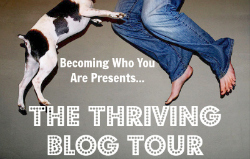 If you feel inspired to revolutionise your relationship with self-care and your own relationship with yourself, I invite you to join us for From Coping to Thriving, which starts next Monday 15th September.
If you feel inspired to revolutionise your relationship with self-care and your own relationship with yourself, I invite you to join us for From Coping to Thriving, which starts next Monday 15th September.
By the end of this six-week course, you’ll have greater insight and awareness into your current habits and how to introduce more self-care into your daily life, a framework you can use going forward to replace bad habits with more self-caring behaviours, deeper self-connection, greater self-knowledge—and the sense of peace and possibility that comes with both these things—plus a toolbox of practical resources and actionable ideas that are yours to keep and use indefinitely.
Registrations close 12am PST on Monday 15th September (4 days from now!) so make sure you reserve your spot soon. Click here for more information and to register.
Thanks for reading. If you know someone who might be interested in this post, please share it using the buttons below.
Get the free ebook “The 5 Most Common Blocks to Authenticity… and How to Overcome Them” plus weekly updates, product discounts and much more:
The post {Video} Creating Daily Opportunities for Self-Care appeared first on Becoming Who You Are.








 Related StoriesIntroducing “Relax, Restore, Revive”: A Free Course in Self-CareWhat Self-Care Pros Do Differently (and Why It Matters)Episode 63: Pleasure, Permission and Self-Care with Iris Barzen
Related StoriesIntroducing “Relax, Restore, Revive”: A Free Course in Self-CareWhat Self-Care Pros Do Differently (and Why It Matters)Episode 63: Pleasure, Permission and Self-Care with Iris Barzen
September 6, 2014
Episode 63: Pleasure, Permission and Self-Care with Iris Barzen
This week’s episode is an interview with fellow coach and friend Iris Barzen.
Iris helps courageous women become Wild Woman—the most radiant, soulful, feminine version of themselves. Fiercely rooted in their feminine, Wild Women lead their lives with ease and grace. Iris teaches women how to intuitively create the life they want, feeling the way they want to feel on the journey towards their goals.
Topics we cover include:
What pleasure looks like in our day-to-day lives
The common mistake that most of us make with the way we think about pleasure and permission
Why we need to be in love with the process of achieving a certain goal, rather than the goal itself
How to do a commitment cleanse
The litmus test for identifying whether or not you really want something
And much more.
Watch the video here or listen to the podcast below:
(Due to a video glitch, the screen is frozen for the first few minutes of the conversation, but we do come back to life after that!)
Useful Links
Iris kindly put together a special page for Becoming Who You Are readers and listeners with all the links and resources she mentioned during the conversation.
From Coping to Thriving, the six-week course that will change the way you approach self-care and create a practice that helps you unleash your best self.
Say Hello
Iris
Email: iris{at}irisbarzen{dot}com
Website: irisbarzen.com
Hannah
Twitter: @becomewhour
G+: plus.google.com/+HannahBraimeBWYA
Website: becomingwhoyouare.net
Share the Wisdom
"Look for the little moments of delight" - @irisbarzen talks to @becomewhour about pleasure
Click To Tweet - Powered By CoSchedule
No one will hand you a permission slip saying "You can do whatever you want with your life now"
Click To Tweet - Powered By CoSchedule
If we want to achieve something, we need to be in love with the process.
Click To Tweet - Powered By CoSchedule
Subscribe to the Podcast
Intro and outro: Stephanie Murphy
Image credit: Sunset Girl
The post Episode 63: Pleasure, Permission and Self-Care with Iris Barzen appeared first on Becoming Who You Are.









 Related StoriesEpisode 62: Food, Radiance, and Personal Journeys with Claire BakerEpisode 61: Travelling the World, Making Music, and Creating Your Own Path with Charlotte ErikssonEpisode 57: How to Create Lasting Change with Nicole Antoinette
Related StoriesEpisode 62: Food, Radiance, and Personal Journeys with Claire BakerEpisode 61: Travelling the World, Making Music, and Creating Your Own Path with Charlotte ErikssonEpisode 57: How to Create Lasting Change with Nicole Antoinette
September 2, 2014
Introducing “Relax, Restore, Revive”: A Free Course in Self-Care
I don’t know about you, but I find that September can be quite a pivotal time. Even though I’ve been out of school for years now, I still have an internal clock that sees this month as the start of something new; a time for re-evaluation, renewal, and refreshment of things that aren’t serving me any more.
It’s also a time of transition in the greater world. Summer turns to winter (or vice versa if you’re down South) and the old fades away to make way for the new.
With this in mind, I’ve created Relax, Restore, Revive: 7 Days of self-care magic. This free course is about opening up opportunities for self-connection, restoration, and a deeper sense of energy and purpose for the autumn.
Starting next Monday (8th September), you’ll get an email each morning with a quote, question, activity, or other tidbit of food-for-thought around the theme of “Relax, Restore, Revive”.
By the end of the week, you’ll have had a chance to reflect on what’s serving you (and what isn’t), tap into your most fundamental needs, and create a mini-plan for how to engage with these needs daily going forward.
If you’ve been thinking of joining From Coping to Thriving and want a taste of the kinds of things we’ll cover on the course, Relax, Restore, Revive is perfect. Register here.
Do you know someone who could use some relaxation, restoration, and reviving? Use the tweets below to share the love:
The post Introducing “Relax, Restore, Revive”: A Free Course in Self-Care appeared first on Becoming Who You Are.








 Related StoriesWhat Self-Care Pros Do Differently (and Why It Matters)How to Be Kind to Yourself When You’re Feeling OverwhelmedIt’s Time to Put Down the Crutch and See What Happens
Related StoriesWhat Self-Care Pros Do Differently (and Why It Matters)How to Be Kind to Yourself When You’re Feeling OverwhelmedIt’s Time to Put Down the Crutch and See What Happens
September 1, 2014
How to Be Kind to Yourself When You’re Feeling Overwhelmed
Listen to this post here:
All of my posts are based on my own experience in one way or another, and this one is no exception… If you’re part of The Tribe, you might know that I got married at the beginning of August (happy happy! :)). This was an awesome time, with a lot of laughter, a lot of love, and a lot of fun, and it was also super busy.
The week before, I had one of those epiphanal conversations with a friend that totally changed the way I approached the next couple of weeks and left me deep in thought about how kind I am to myself when there’s a lot going on in my life.
And it’s not just me; many of my clients say the same thing in one way or another. It’s hard to be kind to ourselves when we have big events, multiple commitments, and various demands pulling our attention and energy in different directions.
If you’re in that place right now, here are a few suggestions I’ve found helpful:
1. Accept that you have a lot going on and adjust your expectations accordingly
I generally work better under pressure; as Parkinson’s Law states, a task will expand to fill the time we allot to it. At the same time, however, I have a part of me that I (affectionately) describe as my internal slave-driver. She expects me to do all the things right this week, regardless of what else is going on or what else I want to be doing (like spending quality time with my husband and friends).
During the aforementioned conversation, my friend said that she opened that week’s email to the Becoming Who You Are community fully expecting it to say “You won’t be hearing from me for the next two weeks” and re-read it three times to make sure she hadn’t just missed that part.
The thing that really struck me was this: it hadn’t even occurred to me to write that; I was planning to schedule blog posts, podcasts, emails, and even a couple of videos to go out in my absence so everything would continue as normal.
As this friend lovingly pointed out, being transparent about taking two weeks off is a lot more aligned with my values and what I encourage other people to practice than trying to do everything and more beforehand and not leaving much room for self-care and enjoying the moment (as the saying goes, sometimes we teach what we most need to hear ourselves).
2. Hone in on your most important priorities
After that conversation, I went through everything that I’d committed to over the next seven days and re-evaluated. Most of it I pushed back to address after my break, some of it I threw out completely. This was not easy. It meant changing dates of webinars and that horrible “Am-I-being-flaky?” feeling that comes with deciding to skip two weeks of martial arts in a row, and tell my partner that I didn’t want to go out dancing that week. It also meant that I was far more able to enjoy what was really truly important and stop worrying about things that, in a few years time, I’m unlikely to even remember.
During the week itself, I made a list of the most important “to do” items the night before. That meant I went into each day knowing exactly where I stood and also accepting that if I did these things, that was enough.
3. Focus on your non-negotiables
Non-negotiables seem to be one of the first things to go when we’re busy. We sacrifice things like journaling, yoga, exercise, and all those other things we put on the “not so important” list, when actually these are the most important things to do during this time.
Non-negotiables (as the name suggests) are the things that keep us functioning as the healthiest, happiest versions of ourselves. When we do these things, it feels like life is working.
I didn’t prioritise these things over the last month, and it made a huge difference. As soon as I recognised that I’d let my non-negotiables slide and started making time to journal, exercise, and meditate again, I immediately felt a lot more in control of my time and energy.
4. Be clear with others that you have a lot going on
People aren’t mind readers, so we need to be clear with others when we have things going on that are going to affect our ability to show up and stick to commitments. Even if you think it looks obvious that you’re overwhelmed, it might not be to other people.
You don’t need to go into details if you’re not comfortable or it’s not appropriate, but you can still let people know that you might not be as present or attentive for a while or that you’re unable to continue with certain commitments for now.
5. Get really good at accepting help.
This might sound obvious, but I seem to need this lesson a lot so I’ll mention it here: you don’t need to do everything yourself.
I tend to think that I’ll be putting people out or annoy them if I ask for help, however like Amanda Palmer says, people often appreciate us giving them the opportunity to let them support us—especially if we’re usually a bit of a lone ranger when it comes to navigating life.
Chances are that we’ve built up enough credit in our friendship accounts to make an ask in the knowledge that we’ll gladly repay the favour one day. Another aspect to this is knowing how to accept help. Help is like a gift; if people want to give you some, it generally means they’re not going to be put out or irritated if you say yes (unless they are playing some kind of “aha, now you’re indebted to me” game, in which case steer clear).
6. Focus on what you’ve achieved rather than what you haven’t
When my internal slave-driver started rearing her head and telling me I “should” be doing X, Y, and Z, I took a few moments to remind myself of all the things I was doing. Focusing on what I achieved rather than what I didn’t helped turn a sense of “I’m not doing enough” into “I’m doing just fine”.
Remember that not everything has to happen right now.
Click To Tweet - Powered By CoSchedule
Yes, the carpe diem life-is-short mindset is very en vogue right now, and yes, there is certainly a time and a place for that kind of perspective, but when I’m already feeling stressed and over-committed, I find it easier to remember that tomorrow is another day.
7. Be a creator, not a victim
Sometimes, life hands us one NAFGO (“not another f***ing growth opportunity”) after the other. Most of the time, we have too much going on because we made certain decisions that aren’t serving us. Whatever the case, we’re far more likely to navigate this period if we take responsibility for how we’re feeling and what we’re doing, rather than throw our hands up in the air and declare that life is just too hard, it’s all hopeless, and there’s nothing we can do anyway.
The story we tell ourselves about our situation will dictate what we do next.
Click To Tweet - Powered By CoSchedule
If we feel like victims, the chances are we won’t do much. We’ll continue to bemoan our bad luck, bad circumstances, and throw a “woe-is-me” pity party. We want empathy for our situation but are so stuck in victim mode we’re not actually giving ourselves any. At the same time, we give away our freedom to choose and slip into passively accepting that life is doing stuff to us, rather than recognising the role that we’ve played in creating our reality.
If we recognise that we are responsible for what happens next, we have the opportunity to take a step back and ask ourselves “how do I want to respond to this situation?” and “I wonder what I could do differently next time to prevent something like this happening again?” I find it helpful to think about a future (I.e. Older, wiser, and hopefully more evolved) version of myself and question what she would think about this situation.
Remember that most of the things we worry about today won’t even be a spec on our radar in 10 years’ time.
Imagine yourself in 10 or 20 years and ask:
* How could I handle this situation in a way that would make that version of myself proud?
* What advice would that version of myself have for me today?
* Based on what is important to that version of myself in 10/20 years’ time, how would she suggest I respond to this situation right now?
Finally, remember that this isn’t a one-time deal; being kind to ourselves when we have a lot going on is a moment-by-moment process. We don’t arrive at a point where we just “are” kind; like a ship’s crew riding out a storm, we might need to keep bracing ourselves against what’s coming next.
Whenever I’ve had too much going on, the number one thing that has put me back on the path to self-kindness is acknowledging the truth of the matter: that there is a lot going on, that maybe I could have made some decisions differently, that it feels hard and maybe even a little bit painful right now, and that I’m not sure of the best path through.
Start with acceptance, and work your way up to the surface from there.
P.S. Relax, Restore, Revive: 7 days of (free!) self-care magic starts next Monday // Looking for some self-kindness inspiration? Get yours here.
P.P.S To dive deeper into the art of being kind to yourself when you have a lot going on, I invite you to join us for From Coping to Thriving, which starts two weeks from today on the 15th September.
Thanks for reading. If you know someone who might be interested in this post, please share it using the buttons below.
Get the free ebook “The 5 Most Common Blocks to Authenticity… and How to Overcome Them” plus weekly updates, product discounts and much more:
The post How to Be Kind to Yourself When You’re Feeling Overwhelmed appeared first on Becoming Who You Are.








 Related StoriesWhat Self-Care Pros Do Differently (and Why It Matters)Kind & Creative #6Kind and Creative #1
Related StoriesWhat Self-Care Pros Do Differently (and Why It Matters)Kind & Creative #6Kind and Creative #1
August 28, 2014
Episode 62: Food, Radiance, and Personal Journeys with Claire Baker
In this week’s episode of the Becoming Who You Are podcast, I’m chatting to Claire Baker from This Is Lifeblood.
 Claire is a certified coach and mentor, passionate writer and speaker and author of ‘She Is Radiant: Your 6-Week Wellness Adventure To Get Glowy & Feel Rad’. Claire guides vibrant young women as they get from where they are, to where they want to be – in their health and life, blog and business.
Claire is a certified coach and mentor, passionate writer and speaker and author of ‘She Is Radiant: Your 6-Week Wellness Adventure To Get Glowy & Feel Rad’. Claire guides vibrant young women as they get from where they are, to where they want to be – in their health and life, blog and business.
With a background in visual arts and business management, her gorgeous clients (from all over the world), experience greater confidence, improved relationships, more joy and clear complexions. They throw out the scales, book the flight, launch the blog – and fall back in love with their life.
Topics we cover include:
What radiance means to Claire, why it’s important, and how to add more radiance to your life
How our relationship with food mirrors our relationship to other areas of our life too
How to develop a healthier relationship with food (and why it’s a moment-to-moment process)
The number one rule we need to follow whenever we want to add something new to our lives
Why personal growth is all about the process, not the destination
Useful Links
She Is Radiant: Your 6-Week Wellness Adventure To Get Glowy & Feel Rad
Join the Becoming Who You Are Tribe, a free community for self-kindness, creativity, and everything in between.
From Coping to Thriving, the six-week course that will change the way you approach self-care and create a practice that helps you unleash your best self.
Say Hello
Claire
Facebook: facebook.com/ThisIsLifeblood
Instagram: @_clairebaker_
Website: thisislifeblood.com
Hannah
Twitter: @becomewhour
G+: plus.google.com/+HannahBraimeBWYA
Website: becomingwhoyouare.net
Share the Wisdom
Life is to be enjoyed not endured.
Click To Tweet - Powered By CoSchedule
The way we do anything is the way we do everything
Click To Tweet - Powered By CoSchedule
When we want to bring something new into our lives, something else has to give.
Click To Tweet - Powered By CoSchedule
Life isn't about finding ourselves, life is about creating ourselves.
Click To Tweet - Powered By CoSchedule
Subscribe to the Podcast
Intro and outro: Stephanie Murphy
Image credit: Webvilla
Thanks for reading. If you know someone who might be interested in this post, please share it using the buttons below.
Get the free ebook “The 5 Most Common Blocks to Authenticity… and How to Overcome Them” plus weekly updates, product discounts and much more:
The post Episode 62: Food, Radiance, and Personal Journeys with Claire Baker appeared first on Becoming Who You Are.









 Related StoriesEpisode 61: Travelling the World, Making Music, and Creating Your Own Path with Charlotte ErikssonEpisode 60: Rewriting Our Stories with Sas PetherickEpisode 54: Healing Your Relationship with Food with Kendra Tanner
Related StoriesEpisode 61: Travelling the World, Making Music, and Creating Your Own Path with Charlotte ErikssonEpisode 60: Rewriting Our Stories with Sas PetherickEpisode 54: Healing Your Relationship with Food with Kendra Tanner
August 27, 2014
What Self-Care Pros Do Differently (and Why It Matters)
Listen to this post here:
Friends, this has been one of those weeks. I returned to the computer last Monday after a couple of weeks off only to find that my email had broken and messages sent to me and and by me had been disappearing into the ether for nearly a week. At the same time, my trusty Macbook started acting up, and I’ve found myself sitting in front of the spinning beach ball of doom for more hours than I want to think about over the past few days.
And you know what? It’s at least partly my fault. As Mr BWYA, who was patiently helping me with a couple of short-term fixes, pointed out “Your computer is your office, it’s worth taking care of.”
Although it’s not like I throw my laptop around, I am guilty of seeing the little “Updates ready to install” notification in the top right-hand corner and swiping it to one side so it will go away. Every day. For the last year. I’m still running software that hasn’t been updated since 2009. I have tons of stuff sitting on my hard drive that I “might need some day” (read: probably won’t remember I have it even if I do need it). All in all, my approach to my office has been decidedly amateurish.
Which brings me to the topic of today’s post.
In his excellent book “Turning Pro“, Steven Pressfield outlines the distinction between the amateur and the pro in the context of work. Amateurs wait until inspiration strikes, get lured away by distractions, and give in to resistance, while pros show up each day, focus on what’s important, notice resistance and do the work anyway.
This contrast doesn’t just apply to work, it applies to other areas of our lives too.
In everything we do, we have a choice: to do it as an amateur, or as a professional.
Click To Tweet - Powered By CoSchedule
This isn’t about the result of what it is we’re doing, but about the process (as Steven points out, perfectionism is actually a sneaky form of resistance that gets in the way of showing up as a pro).
What does showing up as a pro look like? Commitment, dedication, consistency, focus, being a creator rather than a victim, doing the best we can in that moment, even when the easier choice is to give in or give up.
This applies just as much to self-care as it applies to anything else.
Amateurs talk about doing self-care but they don’t actually do it (or they think that self-care is for people who can’t handle day-to-day life and need to “toughen up”). Even if they know on an intellectual level that it’s the right thing to do, the amateur doesn’t translate that knowledge into action until they reach breaking point. Amateurs get stuck in a cycle of breakdown and recovery, saying “I really need to start dedicating more time to self-care” and blaming external factors for why they’re not doing that yet. Amateurs feel like they are victims of circumstance rather than creators of their own reality.
Pros walk their talk; they know how important self-care is and they make sure they dedicate time to getting enough sleep, exercising, eating right, and meeting their needs—even on the days they don’t feel like it. Pros know the warning signs that crop up when they’re feeling drained or stretched, and they do what they need to do to take care of their needs. Pros know that self-care is about setting boundaries with themselves and others, and they do this even when it feels uncomfortable.
Pros feel like they are the creators of their own reality, rather than victims of circumstance.
Click To Tweet - Powered By CoSchedule
Why this difference matters
A few years ago, I came face-to-face with the fact that I was an amateur when it came to self-care. I just did not take care of myself. As an amateur, I thought not having a single day off for three months in a row was something to be proud of. I forced myself to push on with listening to the signs that things weren’t right. I rejected my needs—understandable, as I didn’t know how to listen to them at the time—and tried to squeeze myself into boxes I thought I should fit into, rather than accepting and acknowledging the box I actually did fit.
I had to learn this lesson over and over again. In many ways, I’m still learning it.
And it’s changed my life. I’m clearer on my priorities. I take better care of my physical and emotional well-being. I have clearer boundaries, and I’m fare more accepting of myself. This has enabled me to show up as the best version of myself, rather than a confused, toned-down shadow. It’s helped my relationships, helped my business, and, most importantly, I enjoy life far more.
So I encourage you to take a moment right now and ask yourself, gently and honestly: Am I approaching my self-care as a pro or as an amateur?
If the answer is the latter, I invite you to join us for From Coping to Thriving: Six Weeks to Self-Care, Self-Compassion, and a healthier, happier you.
This course will catapult you from amateur to pro status in the realm of taking care of yourself and your needs. By the end of our time together, you’ll have a completely different perspective on self-care, and you’ll know exactly what you need to do to show up as the best version of yourself in the world.
As the pro knows, self-care isn’t a luxury, it’s a necessity. Click here to find out more and reserve your spot today.
P.S. The secret ingredient that helps me thrive & self-care: an important reminder
Thanks for reading. If you know someone who might be interested in this post, please share it using the buttons below.
Get the free ebook “The 5 Most Common Blocks to Authenticity… and How to Overcome Them” plus weekly updates, product discounts and much more:
Image: John French
The post What Self-Care Pros Do Differently (and Why It Matters) appeared first on Becoming Who You Are.








 Related StoriesIt’s Time to Put Down the Crutch and See What HappensSelf-care: An Important ReminderA Brief Guide to Amsterdam
Related StoriesIt’s Time to Put Down the Crutch and See What HappensSelf-care: An Important ReminderA Brief Guide to Amsterdam

